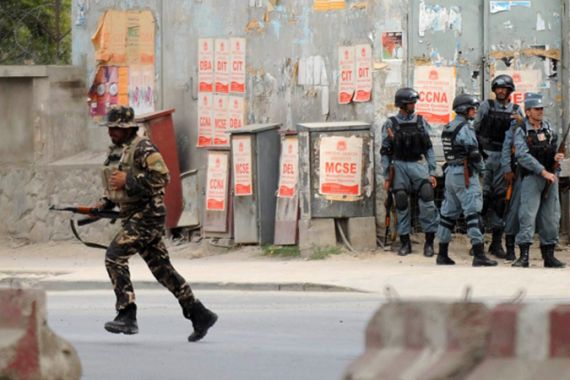Taliban target key sites in Kabul
Battle with Afghan forces dragged into the night after a day of chaos in the capital.

Taliban gunmen armed with suicide vests and heavy weaponry on Tuesday launched co-ordinated attacks in the Afghan capital, Kabul, targeting NATO’s headquarters, the US embassy, and the Afghan intelligence agency.
Heavy gunfire continued to be heard late into the night as Afghan forces battled to clear a building in the city’s diplomatic quarter which had been taken over by heavily armed fighters. Rockets have reportedly been fired at the US and other embassies in the area.
At least three policemen and four civilians have been killed and many others injured, according to police and hopsital sources.
Police surrounded the occupied building, calling in air support to flush out gunmen inside the building.
NATO has confirmed that they are providing Afghan forces ground and air support in the operation.
Hamid Karzai, the Afghan president, condemned the attacks and and said it could not not hamper the security transition from NATO to Afghan forces.
“The attacks cannot stop the process [transition] from taking place and cannot affect, but rather embolden our people’s determination in taking the responsibility for their country’s own affairs,” Karzai said in a statement.
Multiple explosions
Only an hour after the attack near the US embassy, heavy explosions were heard in other parts of the city.
Just a few kilometres away in the west of Kabul, a suicide bomber detonated himself near a police building, killing one policeman.
|
|
A second suicide bomber wounded two people when he detonated himself near Habibia high school also in the west of the city.
“The primary targets of the attackers are the intelligence agency building and a ministry,” Zabihullah Mujahid, spokesperson for the Taliban, told the Reuters news agency on Tuesday from an undisclosed location.
The US embassy in Kabul said no personnel had been reported injured.
NATO’s International Security Assistance Force’s (ISAF) headquarters in Kabul was also one of the targets in the ongoing Taliban attack in the centre of the city, a Western military source told the AFP new agency.
Mohammad Zahir, head of Kabul’s Crime Investigation Unit, said: “There has been an explosion and gunfire, there are several armed attackers in Abdul Haq Square. There could be suicide bombers but it is unclear at the moment.”
Police and other security officials blocked roads around the US embassy and other diplomatic missions.
‘Security transition’
The White House said US President Barack Obama was briefed on the attacks targeting the US embassy and NATO headquarters.
Secretary of State Hillary Clinton called it a “cowardly attack” that would not deter US efforts.
“We will take all necessary steps, not only to ensure the safety of our people, but to secure the area and to ensure that those who perpetrated this attack are dealt with,” Clinton told reporters.
Anders Fogh Rasmussen, NATO’s secretary-general, said he was confident Afghan forces could deal with the Taliban assault.
He added that efforts by Taliban fighters to derail NATO’s handover of security responsibility to Afghan forces by 2014 would not work.
“We are witnessing that the Taliban try to test transition but they can’t stop it. Transition is on track and it will continue,” he told reporters after talks with Andris Berzins, the Latvian President.
The attack in Kabul follows a huge truck bomb attack on a NATO base in central Afghanistan in which four Afghan civilians were killed and 77 US troops wounded, on the eve of the anniversary of the September 11, 2001 attacks.
Last month, Taliban attackers laid siege to the British Council, killing at least nine people during an
hours-long assault on the 92nd anniversary of Afghanistan’s independence from British rule.
Violence in Afghanistan is at its worst since US-backed Afghan forces toppled the Taliban government in late 2001, with high levels of foreign troop deaths and record civilian casualties.